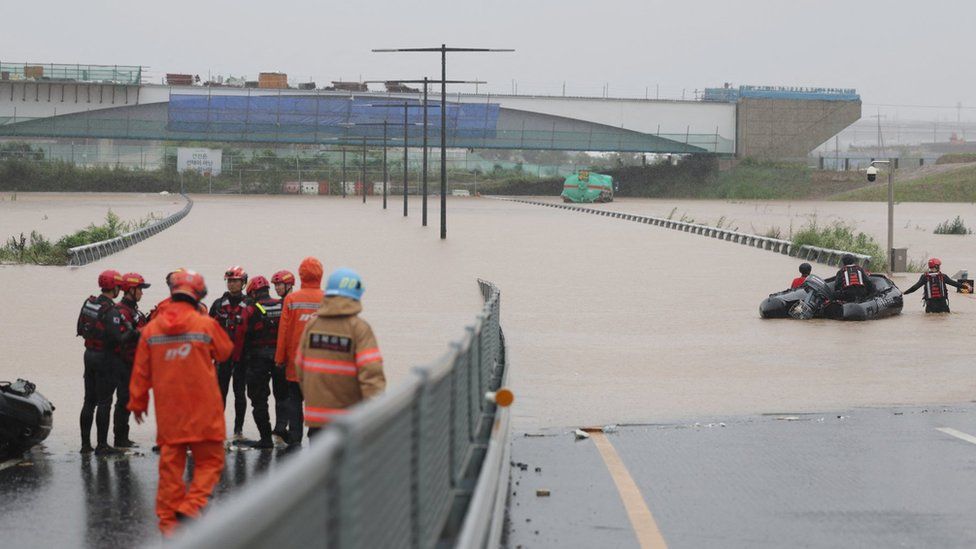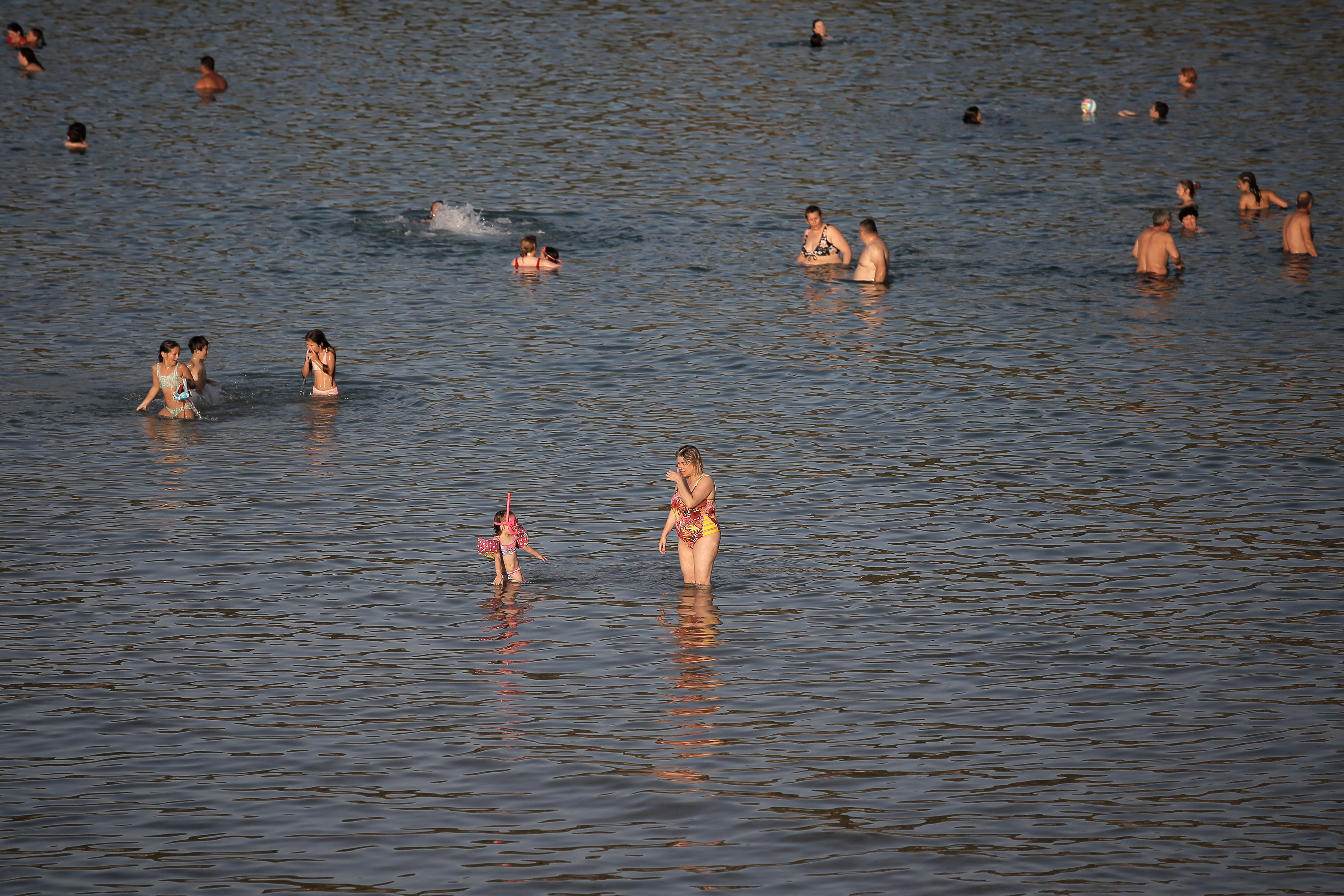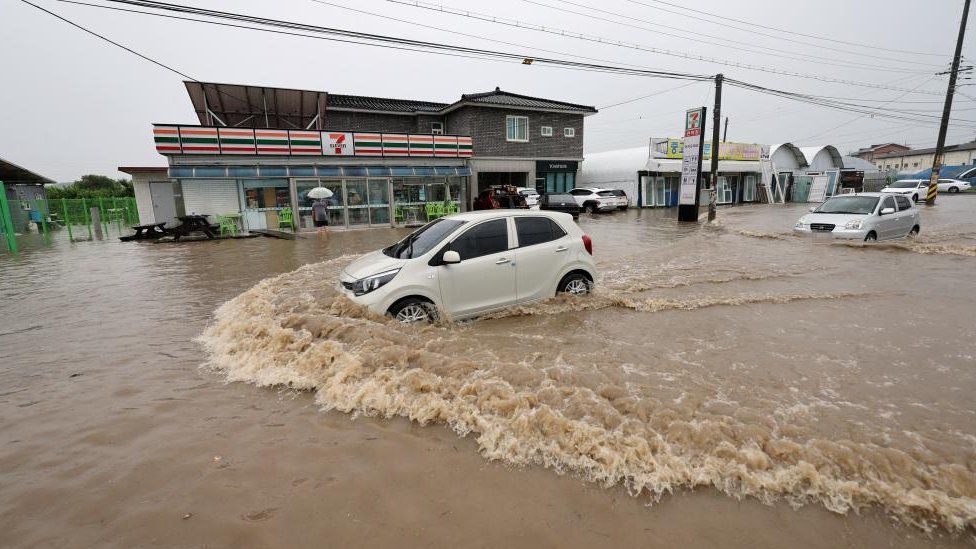Europeans seek shade as heatwave grips much of the continent
Temperatures in Italy are predicted to climb as high as 49C in Puglia, Sardinia and Sicily next week, as the heatwave gripping Southern Europe shows no sign of abating.
Red alerts for extreme heat have been issued in 16 cities across Italy as the Mediterranean country is gripped by blistering hot temperatures.
Tourist hotspots Rome, Florence and Bologna are among some of the cities affected, with people there told to take extra care as the mercury climbs towards 40C amid the Cerberus heatwave.
Temperatures on Saturday peaked at around 36C (96.8F) in most Italian cities, though Puglia, Sicily, and Sardinia were expected reach up to 41C.
Meanwhile, homes have been destroyed and hundreds of people evacuated after a forest fire ripped through the Spanish island of La Palma in the early hours of Saturday.
Authorities said at least 500 people were forced to flee their homes in the first natural crisis on the island since a volcanic eruption in 2021.
16 red alerts issued for Italy
Authorities in Italy have issued red alerts for 16 cities across the country amid a sweltering heatwave.
Bologna, Florence and Rome are among some of the cities affected, with residents there told to take extra care.
Temperatures could exceed 40C in parts of Puglia, Sicily, and Sardinia, forecasters say.
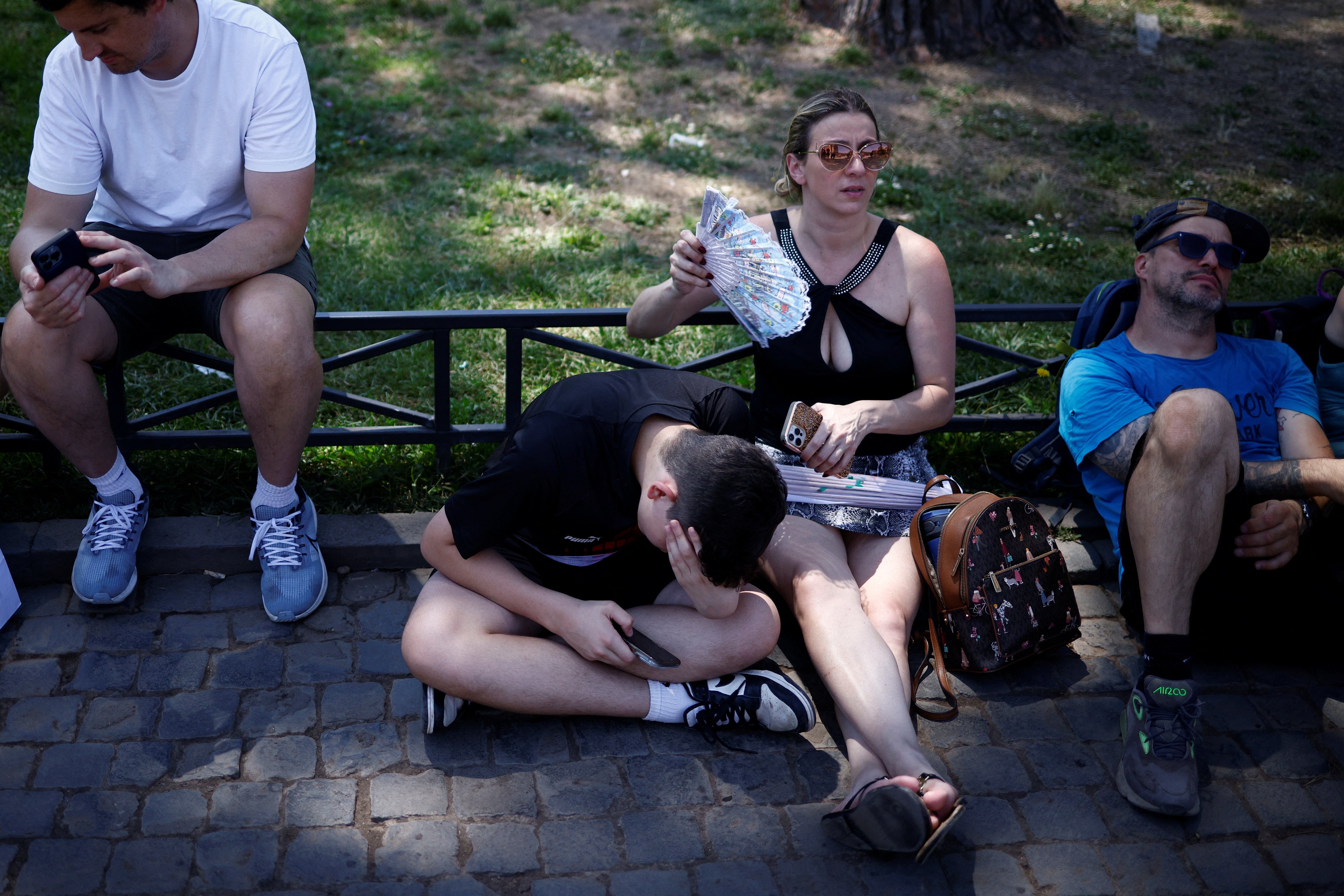
Showers in the UK set to continue for days to come
The Met Office has predicted that unsettled weather conditions are to continue in the UK for the next few days – as the Mediterranean region grapples with soaring heat that could touch a new European record as soon as this week.
Dr Melissa Lazenby, a climate change lecturer at the University of Sussex, explained earlier that the current placement of a high-pressure system located further south is the primary reason for this divergence.
“The current European Heatwave is being driven by stable atmospheric conditions from a stationary high pressures feature,” Dr Lazenby explained.
She added that while it is not possible to determine all the drivers and their exact contributions to the current heatwave yet, Europe is not “particularly affected by El Niño events directly”.
“Therefore it is likely the high-pressure system and climate change are the main contributors to this heatwave event,” she said.
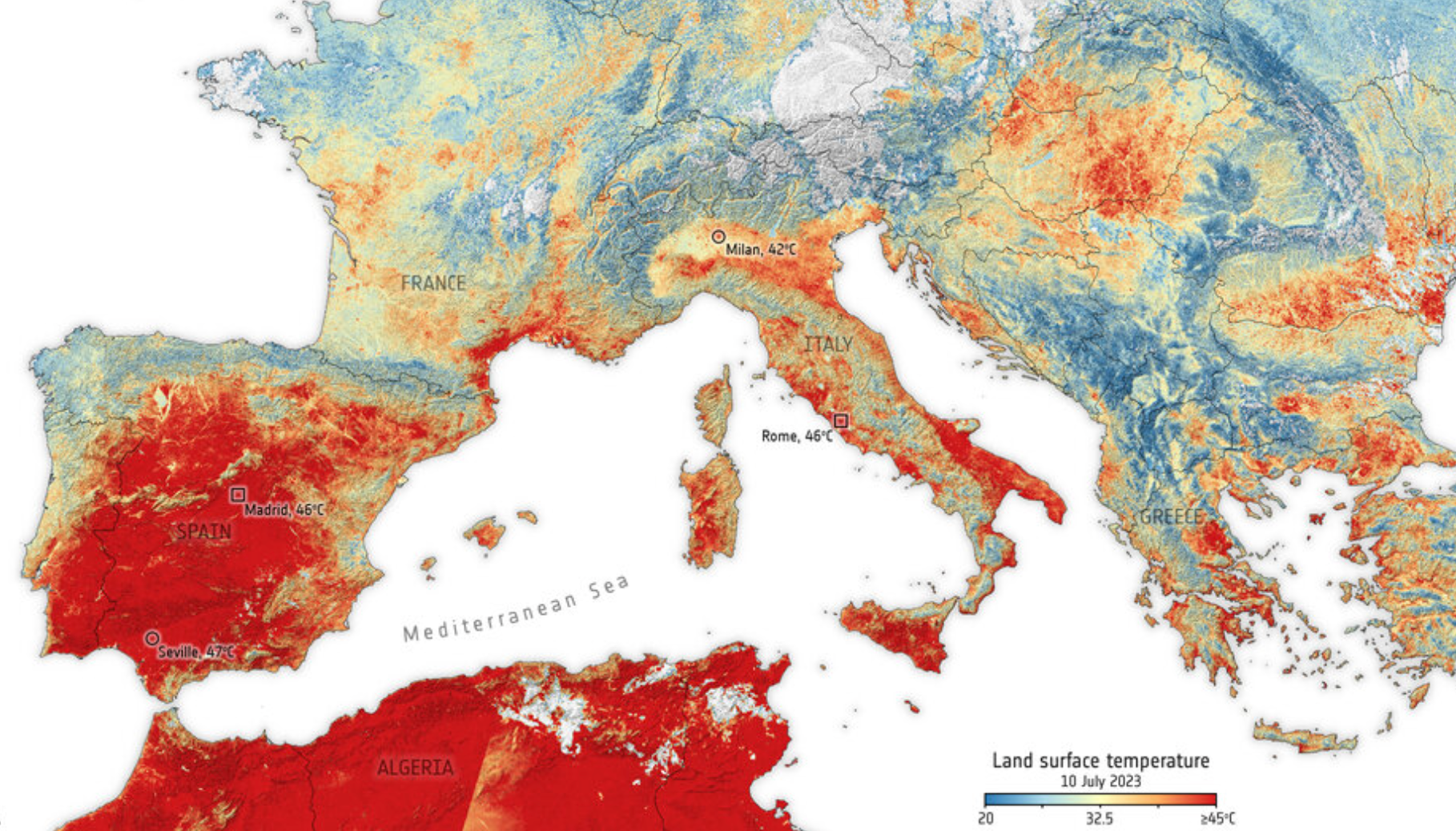
The current heat wave is concentrated in Southern Europe
“The UK at the moment is not experiencing the same high temperatures as the rest of Europe and that is mainly due to the placement of the current high-pressure system, which does not cover the UK and is situated further south,” Dr Lazenby said, “which provides stable atmospheric conditions for enhanced warming and resulting heatwaves”.
“If you are in the UK today, you will notice the higher winds which are not associated with a high-pressure feature and therefore not allowing conducive heatwave conditions explaining why UK temperatures are not anomalously warm like the rest of Europe.”
ICYMI: How climate change to blame for Europe’s heatwave
Climate change is most likely the cause of a blistering heatwave gripping Europe, a meteorologist has said,
Chris England, a Sky News meteorologist, told the network: “Both southern Europe and the southern USA are experiencing extreme and potentially record-breaking heat at the moment.
“The immediate causes in both cases are long-lasting and fairly stationary high-pressure systems that are bringing hot air in and then heating it further through the actions of the sun and by compressing the air – a so-called heat-dome.

A heat map showing how Spain is currently gripped by extreme heat
“Climate change would seem to be the most likely root cause of the excessive heat, although that will take time to verify.
“We are in an El Nino year, but that doesn’t seem advanced enough to bring significant global issues yet.”
La Palma wildfire “out of control”, says regional president
A wildfire that has raged across 4,500 acres in the island of La Palma is “out of control”, Canary Islands regional president Fernando Clavijo said.
More than 2,000 people have been evacuated, and officials warned residents the situation could worsen because a heatwave has made the terrain tinder-dry.
Clavijo said some residents did not want to abandon their homes and appealed for people to be responsible and heed the calls for evacuation.
He said that 10 aircraft were battling the fire and water-dropping planes are expected to arrive.
The wildfire and evacuations come nearly two years after a three-month volcanic eruption caused devastation on La Palma.
While nobody was killed, around 3,000 buildings were buried along with many banana plantations, roads and irrigation systems.
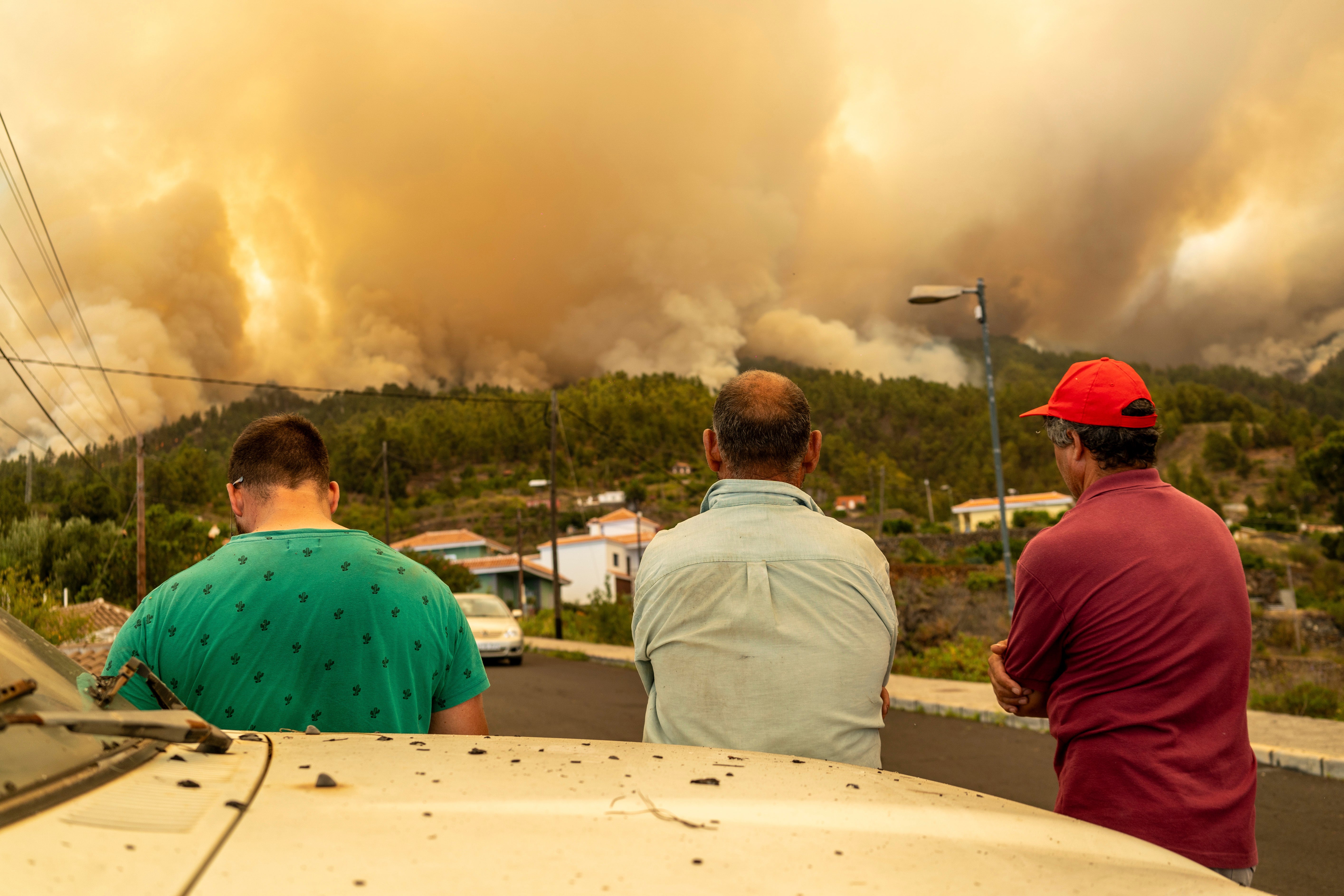
Local residents look on at a burning forest fire, near Puntagorda on the Canary Island of La Palma
ICYMI: How to sleep during hot weather, according to experts
The warmth of summer is usually welcomed with open arms, but we often forget how difficult it can be to get a decent night’s sleep when nighttime temperatures rise.
Nights can become even more uncomfortable during a heatwave, when temperatures meet or exceed the heatwave temperature threshold for at least three consecutive days, and are common in the summer.
Many may find these nights difficult, especially without a fan or air-conditioning.
According to Dr Nerina Ramlakhan, a sleep expert at Silentnight, the optimal bedroom temperature for sleeping is between 16C (60F) and 21C (69.8F), and your brain needs to be slightly cooler than the rest of your body.
Read more by clicking on the below link.
Temperatures in Turkey hit the mid-40s
In Turkey, the tourism hot spot of Antalya saw tempratures hit 44 C, while coastal cities in the south and southwest reached the high 30s and low 40s.
In the northwestern cities of Edirne, Kırklareli and Tekirdag, 48 people were taken to emergency rooms with symptoms of heat stroke in the past two days, the state-run Anadolu Agency reported.
The heat wave also was taking its toll on water levels in Istanbul, Turkey’s largest city.
The main water supply at the Omerli Dam reservoir, already at 41% capacity due to low rainfall, was losing 17,000 tons of water an hour during the early afternoon on saturday, Levent Kurnaz from the Bosphorus University told local media.
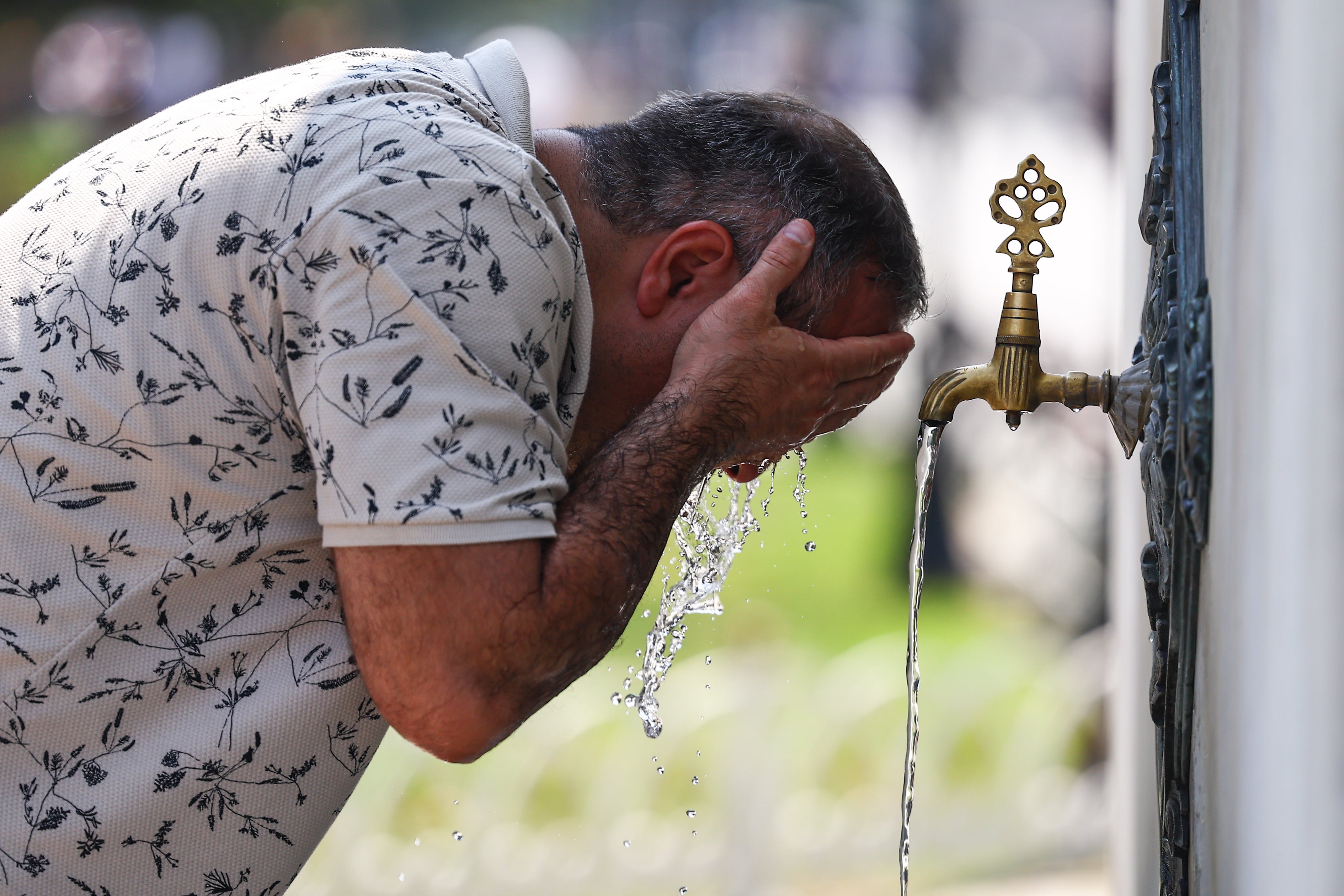
A man cools off at a fountain in Istanbul, Turkey
Temperatures hit 35C in Poland
Authorities in Poland warned older adults in particular to stay indoors or in the shade and well-hydrated as temperatures reached 35C on saturday.
In downtown Warsaw, and in other cities, makeshift hose fountains were arranged to let people and their pets cool off.
Police issued warnings about not leaving children or pets unattended inside cars.
Poland’s highest ever temperature is 40.2C, recorded in 1921.

People rest in a park in Warsaw, Poland, on Saturday, July 15.
Benjamin Netanyahu tells people to drink more water, following hospital admission
Israeli Prime Minister Benjamin Netanyahu appealed on people to drink water and act safely in the scorching summer, after he was rushed to hospital on Saturday.
The Prime Minister was seen by doctors for dehydration, after a day spent in the sun without a hat and without water.
Netanyahu, 73, is Israel’s longest serving leader. He has served multiple terms stretching over 15 years in office. His current far-right government, a collection of religious and ultranationalist parties, took office last December.

Israeli Prime Minister Netanyahu
The US has also been hit by deadly heat
Europe is not the only part of the world currently experiencing unusually high heat: Southern US states are also experiencing near-record temperatures.
“Near record temperatures are expected this weekend!” the National Weather Service in Phoenix, Arizona, warned in a tweet, advising people to drink plenty of water and to check on family members and neighbours.
In Las Vegas, emergency rooms have been treating more people for heat-related illnesses, reported the Associated Press, as the heat wave threatened to break the city’s all-time record high of 47.2C this weekend.
In New Mexico’s largest city of Albuquerque, many public pools were offering free admission.
In Boise, Idaho, churches and other nonprofit groups were offering water, sunscreen and shelter.

A National Weather Service graphic shows expected temperatures across the US this week
Greece under emergency measures as Italy braces for second heatwave
The second “even stronger” part of the Cerberus heatwave, which has ravaged parts of Europe this week, is set to strike Italy in a few days time.
Sardinia and Sicily could see temperatures of 48C next week, which is approaching the continent’s record of 48.8C from 2019.
Wildfires are also tearing through Croatia, causing tourists and locals to flee the area of Grebastica, near Sibenik on the Dalmatian Coast. Propelled by strong winds, the forest fire has caused towns and homes to be evacuated as the blaze spreads.
Maryam Zakir-Hussian and William Mata report:
https://news.google.com/rss/articles/CBMiXmh0dHBzOi8vd3d3LmluZGVwZW5kZW50LmNvLnVrL25ld3Mvd29ybGQvZXVyb3BlL2V1cm9wZS1oZWF0d2F2ZS0yMDIzLXdlYXRoZXItbWFwLWIyMzc1ODE2Lmh0bWzSAQA?oc=5
2023-07-15 23:30:46Z
2204073661

